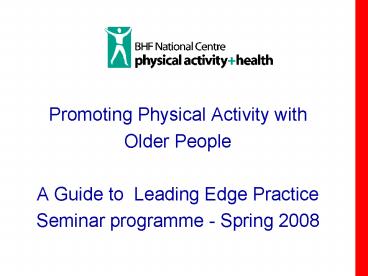Promoting Physical Activity with - PowerPoint PPT Presentation
1 / 20
Title:
Promoting Physical Activity with
Description:
Ageing Well. Physical activity 'At Home' Kirklees MC. 'Next Steps' Wigan MBC ' ... Exercise Programme - Schedule. 2. Telephone follow up. Home Exercise Visits ... – PowerPoint PPT presentation
Number of Views:43
Avg rating:3.0/5.0
Title: Promoting Physical Activity with
1
- Promoting Physical Activity with
- Older People
- A Guide to Leading Edge Practice
- Seminar programme - Spring 2008
2
- Themes and content of the programme
- Update on evidence
- BHF NC Guidelines on older people and physical
activity - Active for Later Life resource
- Policy and partnerships
3
- Why Leading Edge Practice ?
- In the last few years older people and physical
activity has begun to move up the agenda but .. - We need to move from innovation and short termism
to sustained activities and opportunities by
implementing effective interventions and
programmes
4
BHF NC Guidelines on older people and physical
actvity
- How much is physical activity is enough and how
do we communicate this ? - What works in practice ?
- www.bhfactive.org.uk
5
Issues relating to evidence guidelines and older
people
- I.e. What works ?
- Different levels of evidence required and used
e.g. Meta analysis, RCTs, Single Studies. Grey
literature, Expert opinion - Translational theory and dissemination - how do
we turn a research project/evidence into a real
world community programme - e.g. primary care
brief interviews or the US Champs Programme ?
6
Evidence of effectiveness
Can we help to change matters?
- From a critical review of 29 physical activity
interventions - Increased activity levels over a longer period of
time 18 months (75) - Group/class-based and home-based activity were
both effective - Tailored to individual needs
- Cognitive-behavioural strategies and goal-setting
- Accessible choices
- Telephone support and continued contact
- More likely than young adults
- (King et al, 1998)
7
BHF NC Guidelines -
interventions and programming
- Making sense of all the evidence
- Effective interventions and older people
- Population wide
- Programme
- 0ne to one
- Physical activity programming
- (Owen. N 1994, Sallis J. 1998, CDC 2000, NICE
2007) - Identifies components of best practice
8
Evidence based guidance on
population wide interventions
- Environmental (e.g. Building design, urban
environment, natural environment e.g. parks - Crime and personal safety
- Transport and planning
- Policy change
- Campaigns and communications
- Safe and physical activity friendly environments
for the older person
9
Evidence based guidance on Community and locality
based programmes e.g.
- Walking the Way to Health
- Inclusive Fitness Initiative
- Ageing Well
- Physical activity At Home Kirklees MC.
- Next Steps Wigan MBC
- Walk From Home Keighley
- Go 50 - Age Concern Surrey
10
Community or locality based programmes
Target populations, communities and settings
- Time for design and planning
- Partnership development
- Engage participant groups
- Audit current practice
- Marketing and promotion
- Ensure choice
- Build support strategies
- Exit strategies
- Support through change
- Plan for evaluation
- Plan for sustainability
11
Evidence based guidance on1 to 1 interventions
to initiate physical activity
- Practice nurses and GPs,
- Senior health mentors on befriending schemes,
providers of day care centres, managers of
sheltered and supported living schemes, health
and care professionals in residential care and
nursing homes, fitness instructors - (Community) physiotherapists or community
nurses/practitioners.
12
Components of best practice 1 1
interventions with older people
- Use of a health educator and extended
consultation time - Agreement of problem areas
- Goals agreed by both older person and
professional - Identification and recognition of social and
environmental barriers - Tailored action plan
- Choice and range of accessible local activities
- Supplementary educational materials
- Systematic follow-up and support over time
- (BHF 2007)
13
Components of best practice Effective programming
- Overcoming the barriers
- Involve participants
- Ensure accessibility
- Provide appropriate induction
- Assess needs and motivation
- Quality leadership
- Components of fitness
- Develop belonging and ownership
- Recognise achievement and progress
- Educate participants
- Provide social support
- Ensure there are exit routes and opportunities
for change - (BHF 2007)
14
Effective health promotion for older people and
physical activity
- What works ?
- Ecological models that recognise multilevel
components e.g. - Population wide interventions
- Community interventions and programmes
- 1 to 1 interventions
- (Owen, N 1994, Sallis J1998, CDC 2000, NICE 2007)
15
Discussion
- Select one of the guidelines -
- Use components of best practice and
recommendations to bench mark/measure your
planning processes or a current programme - How would you use these ?
16
Common themes
- Engage and involve participants
- Understand and resolve barriers
- Accessible choices
- Support strategies
- Tailoring to individual needs
- Education of participants
- Exit strategies and sustainability
17
Support strategies
- All literature provides strong evidence that they
are effective (NICE, HDA, CDC, Campbell, FAME) - Communication strategies (telephone, email,
letter) - Technologies (diaries, prompts)
- Activities (buddying, social events)
- What do/could you use to support people who are
making the change ?
18
Otago Exercise Programme - Schedule
19
Accessible choices
- How can we provide
- accessible choices ?
- Whats available ?
20
Further information
- BHF NC Guidelines for older people
and physical activity - Benchmarking your own practice
- Section 4 of the Active for Later Life Resource
- The Working Papers
- www.bhfactive.org.uk































